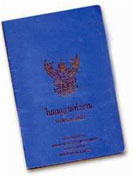
Integrity Legal
- Legal Blog
- Integrity Legal Home
- Thai Visa
- Company in Thailand
- Real Estate Thailand
- US Visa
- Contact Us
Posts Tagged ‘Thailand Business Visa’
27th April 2009
Thailand Visas: Extensions, Multiple Entry, Permanent Residence
Posted by : admin
For the most part issues involving Thailand Business Visas can be broken don into three categories: Thai Visa Extensions, Thai Multiple Entry One Year Visas, and Thai Permanent Residence.
The Thai Multiple Entry One Year Business Visa
A multiple entry business visa is a long term visa that allows the holder the right to remain in Thailand for a period of up to 90 days per entry, but the visas validity is for 1 year. This means that one must make the obligatory “border run” e very 90 days in order to stay in status. A border run is the euphemism used amongst expats in Thailand (and Southeast Asia) when speaking about going to the border with the primary purpose not being to leave the country, but to maintain legal status. An odd “bonus” with regard to the long term visa is the fact that toward the end of the one year visa’s validity one can reenter the country shortly before the visa’s expiration and receive an extra 90 days on the back end.
The Thai Visa Extension
The extension of a Thai visa occurs inside of Thailand. One must file for an extension with Royal Thai Immigration. In order to obtain a visa extension based upon a Business Visa, one must show that the employer has at least four Thai employees for every foreign employee. Also, the visa extension applicant must have a Thai work permit. The business must also produce evidence showing a history of corporate income tax and VAT payment in order to obtain a visa extension for a foreign employee. Finally, should the extension be granted, the foreign visa holder must obtain a reentry permit in order to leave the country and remain in status upon the same visa. (The reentry permit is something akin to reentry permits for US Visas).
Thai Permanent Residence
Thai permanent residence is a difficult and time consuming status to obtain. In order to apply for permanent residence, one must have been resident in the Kingdom for three consecutive years on visa extensions (multiple entry visas will not suffice as one goes out of status at each border run). There are also salary requirements as well as a minimum Thai language proficiency requirement. Once permanent residence is granted the permanent resident will still need to obtain a Thai work permit should he or she decide to obtain employment. The positive aspect of permanent residence is the fact that permanent resident’s visa does not “sunset,” and can only be specifically revoked.
Note: Nothing in this post should be construed or inferred as creating an attorney client relationship nor should be used instead of legal advice from a licensed attorney in your jurisdiction.
14th April 2009
Thailand Work Permits
Posted by : admin

Many people dream of living and working in Thailand. Some love the beaches, while others love the exotic atmosphere and “mai pen rai,” attitude of the Thai people. Still others see Thailand as a land of unexploited opportunity. Whatever employment opportunities Thailand holds, it is imperative that a non-Thai seeking employment in Thailand first acquire a Thai work permit before they begin working in the Kingdom.

The Difference Between a Thai Work Permit and a Thai Business Visa
Unlike some other countries, notably Korea, Thailand has a system in which a long term visa is a different document from a work permit. A common misconception is the belief that a Thai Business Visa gives the bearer the right to work in Thailand. A Business visa and a Thai work permit are two different documents issued by two different Thai government agencies. The Thai work permit is issued by the Thai Ministry of Labour while the Thai Business Visa is issued at a Royal Thai Consulate overseas and extended at a Royal Thai Immigration police office within the Kingdom.
Who Needs A Thai Work Permit?
In Thailand a work permit is a necessity for the expat wishing to earn a living in the tropical Kingdom. Many people in Thailand opt to work without obtaining the proper work permit. Still others work for companies and are told that a Thai work permit is not needed. This scenario is often played out where teaching is involved. Many teachers are told by their schools that they do not need a work permit. In reality, anyone engaging in any sort of labor in Thailand must obtain a work permit. Even those participating in charity work must get a Thai work permit.
How can a Thai Lawyer Assist in Obtaining a Thai Work Permit
A Thai lawyer can give specific advice regarding the steps that must be taken in order to obtain a Thai work permit. Also, a competent legal professional can accompany the non-Thai work permit seeker to the Thai Ministry of Labour (Labor) in order to submit the work permit application and ultimately obtain the actual Thai work permit. It is always recommended that those seeking a Thai work permit retain the services of a legal professional in order to expedite the application properly.
Note: None of the above post should be used in lieu of legal advice from a licensed attorney in the jurisdiction in which one wishes to conduct business.
The hiring of a lawyer is an important decision that should not be based solely on advertisement. Before you decide, ask us to send you free written information about our qualifications and experience. The information presented on this site should not be construed to be formal legal advice nor the formation of a lawyer/client relationship.

 Thailand Call: 02-266 3698
Thailand Call: 02-266 3698 USA Call: 1-(316)-974-0454
USA Call: 1-(316)-974-0454
